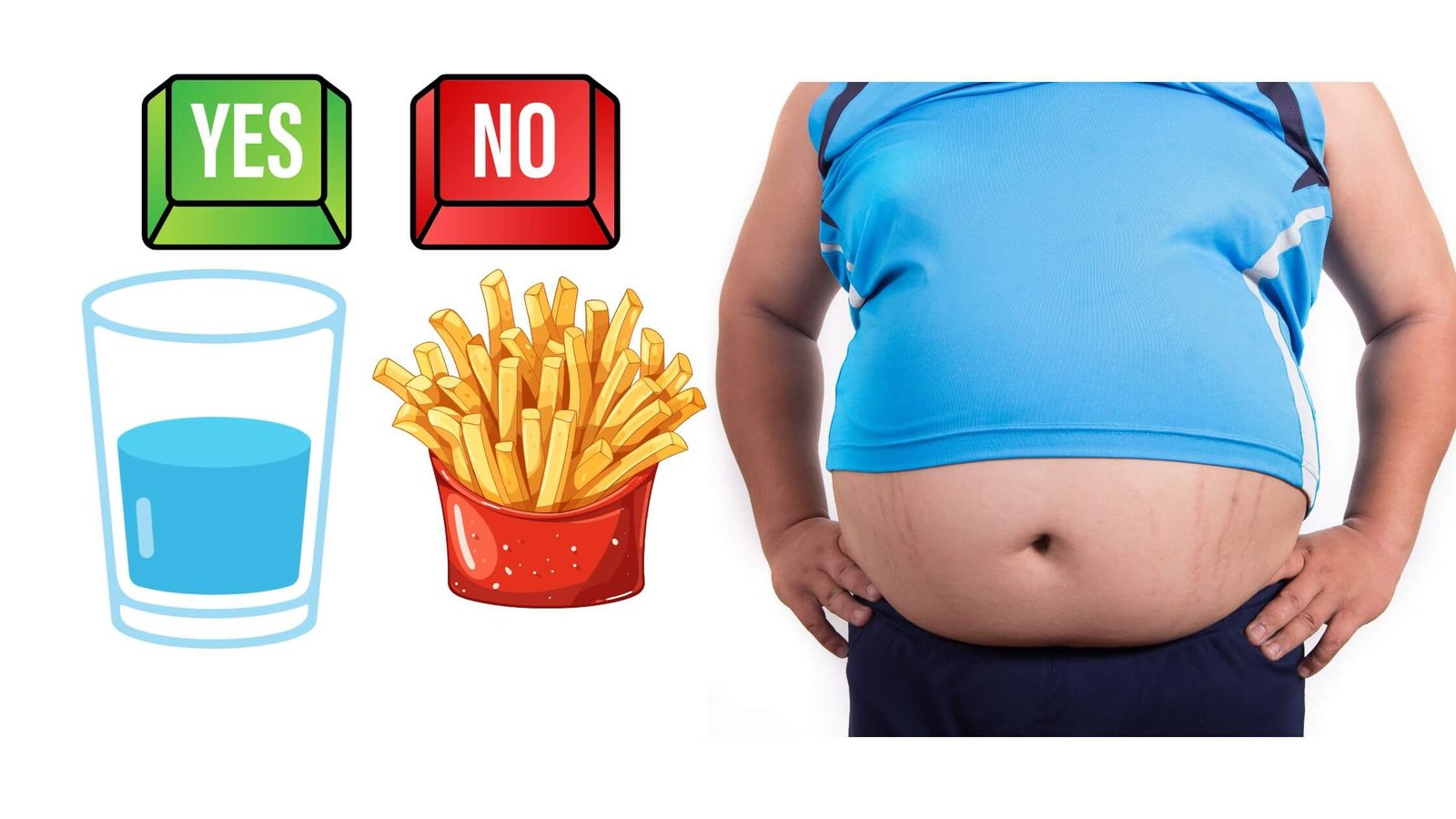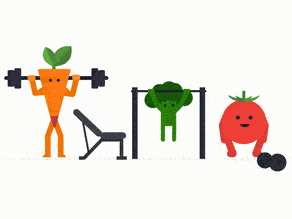Is it Possible for Me to Lose 10 Pounds in One Month Without Causing Any Harm? The 20 Most Effective Methods for Losing Weight Permanently in Just the First Month

Diet and lifestyle changes can aid in weight loss, though aiming to lose 10 pounds in one month may not be suitable for everyone. Weight management is a personal journey, but these tips can be helpful.
Healthy weight loss is a process that takes time, commitment, and patience to achieve. Many people frequently ask how long it takes to lose a certain amount of weight, like 10 pounds, or whether it’s possible to do it in a month.
However, it’s crucial to realize that, for the average person, specialists typically discourage trying to lose 10 pounds in a single month.
Rapid weight reduction can have a negative impact on your health, including raising your risk of gallstones and causing a rebound effect where you quickly regain any weight you lost. A longer duration and lifestyle adjustments are often necessary for a weight loss strategy to be more healthy and sustainable.
How to Safely Lose Weight
Experts advise taking a thorough and varied approach to get started on the proper route to weight loss. This strategy gives the highest priority to important components like healthy eating, consistent exercise, stress management, and adequate sleep.
It places more emphasis on adopting a conscious approach to dietary decisions than merely limiting food intake. Experts stress the value of avoiding processed foods, refined oils, and refined carbohydrates while including a diversity of plant-based foods in your diet.
Experts also advise adding durable and delightful changes to your everyday routine. This could entail engaging in twice-weekly group fitness sessions with pals, cooking plant-based meals with your significant other, or going on leisurely walks alone while listening to your favorite podcast.
When it comes to determining a safe and sustainable rate of weight loss, experts recommend adhering to a target of one to two pounds per week. They point out that although some individuals may experience a more rapid reduction in weight during the initial month after adopting a lower-calorie and healthier diet, it’s important to note that a substantial portion of the weight loss observed on the scale during this period is often attributed to the loss of water weight.
How long will it take to lose weight?
When it comes to the timeline for weight loss, it’s important to recognize that it varies for each individual. Weight loss is not a one-size-fits-all process, and the rate of progress can differ.
On average, a successful approach to weight loss often involves shedding one to two pounds per week. There may be periods where you experience more rapid weight loss and other times when the progress is slower. So, a reasonable and healthy target is to achieve a net loss of four to eight pounds per month.
The time it takes to lose weight depends on several factors, including your starting weight, your target weight, your diet, your exercise routine, and your overall health. There is no one-size-fits-all answer to this question, as weight loss is a highly individualized process.
20 tips to lose 10 pounds in one month
Set Realistic Goals
It’s important to get started on your weight-loss journey with sensible objectives. The American Heart Association recommends losing between one and two pounds per week. You’ll stay inspired on your journey to lose 10 pounds in a month, knowing that your goals are realistic and doable.
Setting oneself up for failure by shooting for the stars is not healthy. Instead, you can achieve steady progress by focusing on a moderate rate of weight loss. The key is to develop a long-term strategy for improving your health that you can stick to.
Mindful Eating
Experts recommend mindful eating as a potent weight-loss strategy. By encouraging greater awareness of your eating patterns, this exercise helps you develop a stronger bond with the food you eat. Savoring each bite, focusing on hunger signals, and identifying emotional eating triggers are all aspects of mindful eating.
This will help you make better meal choices and curb your appetite. Mindful eating can help you choose healthier selections while still appreciating the experience of eating. It’s a strategy that aids in keeping the weight off and staying healthy in the long run.
Balanced Diet
Adopting a balanced diet with a range of important nutrients is necessary for optimal weight loss. For the support of muscles and satiety, this entails including lean proteins such as those found in poultry, fish, and beans. Long-lasting energy can be obtained from whole grains like brown rice and quinoa, while a variety of vitamins, minerals, and fiber can be found in fruits and vegetables.
Remember the value of dietary good fats from foods like avocados and nuts. This equilibrium aids in controlling hunger and keeps you from reaching for bad snacks. Nutrient-rich foods not only help you lose weight but also ensure that your body is functioning at its best, which makes it simpler for you to reach your weight loss objectives.
Stay Hydrated
A basic but frequently ignored component of weight loss is staying hydrated. The National Academies of Sciences, Engineering, and Medicine provide recommendations for daily water consumption to help with appetite control and enhance general health. Dehydration can occasionally be confused with hunger, which results in unneeded calorie consumption.
You’ll feel more content and less likely to overeat if you keep up regular water. Additionally, proper hydration helps a number of body processes, such as metabolism and digestion. Your body will function at its best throughout your weight reduction journey if you have a reusable water bottle with you throughout the day to help you fulfill your hydration objectives.

Exercise on a regular basis

Exercise on a regular basis is essential for effective weight loss. It’s about improving general health, not just reducing calories. According to Harvard Health Publishing, a mix of weight training and aerobic exercises like jogging, cycling, or walking is recommended.
Strength training aids in the development and maintenance of lean muscle mass, while cardio activities raise your heart rate, increase metabolism, and enhance calorie burn. Having more muscle mass results in a higher basal metabolic rate, which makes it simpler to keep weight off. Exercise on a regular basis also releases endorphins, the body’s naturally occurring “feel-good” chemicals that lower stress and improve mood.
Portion Control
The key to reducing your calorie intake is to manage portions well. The Centers for Disease Control and Prevention recommends using smaller plates as a practical measure to avoid overindulgence. Smaller servings appear to be served on full plates because of this illusion, which helps prevent overeating.
This graphic technique encourages awareness of portion sizes and cultivates mindful eating practices. You can eat a variety of foods while successfully controlling your calorie intake by being mindful of both the types and quantities of the things you eat. Portion control is a straightforward yet effective method of weight management that makes it simpler to reach your objectives.
Track Your Food
A useful tool for retaining awareness of your calorie intake is to track your daily food intake. Tracking your food intake may be eye-opening, whether you use specialized software like MyFitnessPal or choose to keep a handwritten food log.
You can use it to recognize patterns in your eating behavior, comprehend your dietary selections, and change your diet as needed to meet your weight loss objectives. Maintaining a food diary keeps you accountable and aware of your nutritional requirements. By keeping track, you may more easily fine-tune your diet for the best weight reduction outcomes by identifying areas where you may be overindulging or not getting enough of certain nutrients.
Cook at home
You can lose weight more easily when you cook at home because you can control the ingredients, serving sizes, and cooking methods. It lets you make healthy, well-balanced meals without adding extra calories or unhealthy ingredients or changing the portions that are popular in restaurants or packaged foods.
You can make smart choices, try out healthy recipes, and change foods to fit your dietary needs.
This hands-on method helps you develop better eating habits and gives you the power to reach your weight-loss goals.

Sleep Well
People often don’t realize how important good sleep is for managing weight. Hormonal changes caused by not getting enough sleep can make you more hungry and increase your cravings, making it harder to say no to tasty snacks.
The National Sleep Foundation says that getting 7-9 hours of good sleep every night should be a top priority. Getting enough sleep is good for your body in many ways. It helps keep your hunger hormones in check, lets your body heal and fix itself, and is good for your health in general. Setting a regular sleep routine and following good sleep hygiene can make it much easier to lose weight and live a healthy life for longer.
Check the food labels.
It’s crucial to take a closer look in a world where hasty packaging decisions and attention-grabbing marketing frequently influence our food choices. The real key to making informed decisions about your nutrition is found in the fine print of food labels.
While some products may proudly display “low fat” or “energy” claims, a deeper examination of the ingredients might reveal a higher sugar content than you’d like in your daily diet. Be vigilant for added sugars like high-fructose corn syrup, molasses, and honey as you decode food labels and make healthier choices.
Stress Management

Stress can be an important trigger for emotional eating, which can result in unwise dietary decisions and excessive calorie intake. Check out the Mayo Clinic’s suggested stress-reduction methods to cope with stress more successfully. These could consist of practicing yoga, deep breathing techniques, mindfulness meditation, or something you enjoy doing.
You can lessen the desire to use food as a coping method by regulating your stress. This modification may completely alter the course of your efforts to lose weight. Techniques for managing stress assist you in maintaining emotional stability and concentrating on your weight reduction objectives while also enhancing your general wellbeing.
Related: 13 Stress Management Techniques To Relieve Stress Fast
Increase fiber.
Increasing the amount of fiber-rich foods in your diet is an effective way to lose weight. The Mayo Clinic acknowledges the many advantages of high-fiber meals. Fiber helps you feel fuller for longer, which reduces hunger and cravings.
Additionally, it helps to control blood sugar levels, which lessens the chance of energy slumps and binge eating. Additionally, fiber encourages good digestion, ensuring that your body processes and removes waste in an effective manner. Include whole grains, fruits, vegetables, legumes, nuts, and legume products in your diet on a regular basis to improve your intake of fiber.
Avoid Liquid Calories
Although sometimes disregarded, liquid calories can have a big impact on weight gain. Sugary drinks can have a lot of calories and added sugars, such as soda, fruit juices, and high-calorie coffee drinks.Since liquid calories don’t give the same sense of fullness as solid meals, they can be especially dangerous, according to Harvard T.H. Chan School of Public Health.
This can result in consuming more calories overall. Consider cutting back on or eliminating sugary drinks from your diet in favor of water, herbal teas, or unsweetened drinks as a way to support your weight loss objectives. This simple change may have a significant impact on your calorie intake and general health.
Info. Caloric needs are highly individual, depending on factors like general health, activity level, gender, height, and age. For weight loss, it’s crucial to determine the calories required to maintain current weight and then reduce intake accordingly, with daily caloric ranges varying from 1,600 to 2,400 for adult females and 2,000 to 3,000 for adult males as per established guidelines.
Healthy Snacking
A common misconception is that snacks make you gain weight. However, healthy snacks can help you lose weight. Snacks can help you stay full between meals and keep you from eating too much if you do them right. Choose snacks that are good for you and filling, like a handful of mixed nuts, Greek yogurt, or cut-up veggies with hummus.
These snacks are better for your weight loss goals than fatty or high-fat ones because they give you important nutrients, make you feel full, and don’t have as much fat. The key is to pick snacks that are both tasty and good for you; that way, you can eat them without feeling bad. Adding healthy snacks to your daily routine can help you keep your energy level steady, resist the urge to eat foods that aren’t as good for you, and lose weight overall.
Work out with HIIT.
Research has shown that High-Intensity Interval Training (HIIT) is a potent tool for weight loss. HIIT effectively increases metabolism and calorie burn by alternating short bursts of intense exercise with brief rest periods.
A study in the Journal of Obesity showed that HIIT can lead to significant reductions in body fat. Additionally, HIIT preserves lean muscle mass, preventing the metabolic slowdown often seen with weight loss. Its time-efficient nature makes it a practical choice for those seeking effective weight-loss results.
Take your time.
Mindful eating, with a deliberate focus on savoring each bite and heeding your body’s signals, is a proven approach to reducing intake and amplifying satiety. A study revealed that eating slowly led to heightened feelings of fullness and satisfaction, potentially benefiting weight loss initiatives. Incorporating tactics such as taking smaller bites, hydrating during meals, and minimizing external distractions can effectively promote slower eating, contributing to weight loss efforts.
Seek Professional Guidance
When you’re trying to lose weight, it’s often a good idea to get help from a professional. A registered dietitian or other health care professional can give you personalized advice based on your wants and situation.
They don’t just give you general weight loss tips; they make a personalized weight loss plan just for you that will help you reach your goals in a healthy way. These experts can make a full plan for you based on your present health, dietary preferences, and way of life. They can take care of any underlying health problems that might be stopping you from losing weight and give you tips on how to get around any problems you may face.
Take in more veggies.
Vegetables, packed with vitamins, minerals, antioxidants, and fiber while being low in calories, are a nutritional powerhouse. A comprehensive review of studies involving over 500,000 individuals demonstrated that those with the highest vegetable consumption had a remarkable 17% reduced risk of overweight or obesity. Boosting your vegetable intake can be as simple as incorporating extra servings into your side dishes, salads, sandwiches, or snacks.
Avoid processed foods.
Consuming packaged and processed foods is frequently associated with weight gain. This includes any product with opaque ingredient labels on its packaging. Prioritizing whole, unprocessed foods above their packaged alternatives is advised.
Even though the latter may boast alluring calorie and carbohydrate counts, whole foods have much superior nutritional value and overall health advantages. By choosing whole foods, you’re consciously choosing to provide your body with nutrient-rich, unprocessed foods that can improve your health and assist your weight-loss objectives.
Avoid being sassy.
These well-liked condiments—mayonnaise, ranch dressing, teriyaki sauce, sour cream, maple syrup, and melted butter—can easily add to a calorie surplus. By eliminating them from your diet, you will consume fewer calories as well as less sodium, sugar, fat, and preservatives. But don’t worry; the flavor of your food won’t change.
All you have to do is exercise your culinary creativity. Use herbs and spices to add taste without adding extra calories. Even though this method by itself might not cause a noticeable monthly weight loss, cutting calories consistently over time will produce beneficial effects.
Stay Consistent
Following through with your plans is what keeps your weight loss journey together. It’s the decision you make every day, your dedication to your goals, and your will to stay on track. This tip sums up how important it is to be consistent and patient throughout the process. Keep track of your growth and enjoy the little wins.
Every healthy meal, good workout, and resisting temptation is a win. Appreciating and recognizing these accomplishments will keep you going. Don’t forget why you started this journey in the first place. These reasons can help you stay determined, whether it’s for better health, more confidence, or a sense of success.
You will inevitably face problems and failures. But if you don’t give up, you can get past them. Remind yourself that losing weight is a race, not a sprint, as you go along. It’s about making changes to your lifestyle that will last and give you long-lasting benefits.
lose 10 pounds in one month Frequently asked question
How many calories should I eat to lose 10 pounds in a month?
Your present weight, level of activity, and other personal circumstances will all influence how many calories you need to burn off in order to lose 10 pounds in a month.Typically, a calorie deficit of between 500 and 1,000 per day might result in a secure weight loss of 1 to 2 pounds per week.For individualized calorie advice, speak with a medical expert or nutritionist.
How quickly can I lose 10 pounds?
Each person loses weight at a different rate. to 2 pounds each week is normally a safe and maintainable rate.It may take 5 to 10 weeks, or even more, to lose 10 pounds, depending on your initial weight, diet, and level of physical activity.
How much weight can I lose in 1 month?
Although the amount of weight you can lose in a month varies, aiming for 4 to 8 pounds (about 2 to 4 kilos) is a sound and fair target.Once more, factors including your beginning weight, nutrition, exercise, and general health affect how quickly you lose weight.
Can I lose 7 kg in a month?
It’s generally not recommended to lose 7 kg in a month.Such quick weight loss might be unhealthy and difficult to keep off.It is advised to lose weight gradually in order to promote both short- and long-term wellbeing.
Can I lose 20 kg in 1 month?
20 kg lost in a month is not seen as safe or realistic.Such drastic weight-loss objectives carry significant health concerns.To protect your health, you should prioritize a progressive and long-term weight-loss strategy.
Can daily walking for 30 minutes help you lose weight?
Walking is a good example of a physical activity that is beneficial for weight management because it helps you burn calories. You may burn an extra 150 calories each day if you add 30 minutes of vigorous walking to your daily schedule. Of course, you’ll burn more calories if you walk more frequently and at a faster speed.
Disclaimer: This information offers general insights. Consult a healthcare professional or dietitian for personalized dietary recommendations tailored to your specific needs and circumstances






